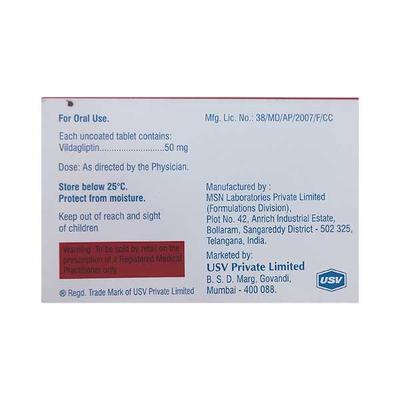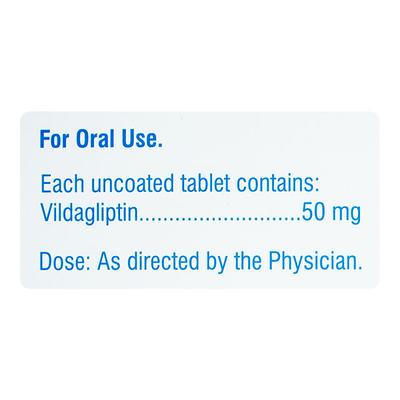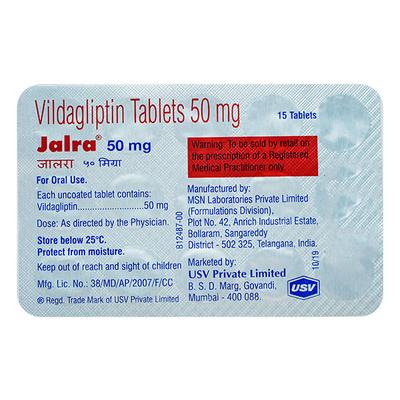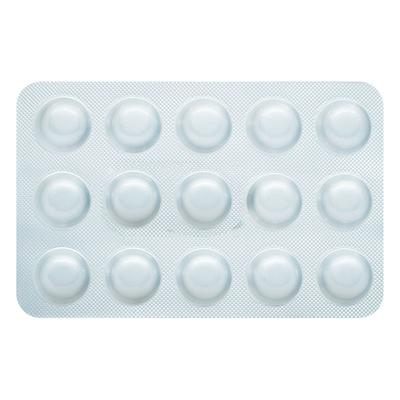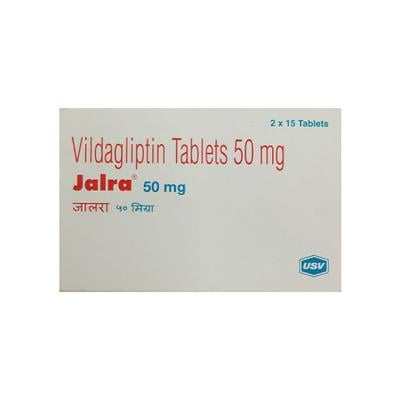

Netmeds First Membership
Quick Links
Introduction About JALRA 50MG TABLET
JALRA 50MG TABLET contains vildagliptin, a clinically tested compound that helps manage type 2 diabetes mellitus by improving blood sugar control. When used along with a balanced diet and regular physical activity, it supports healthy glucose levels and reduces the risk of diabetes-related complications such as kidney damage and vision problems.
JALRA 50MG TABLET is commonly recommended when lifestyle changes like diet control and regular exercise, or other diabetes medicines, are not enough to manage blood sugar levels effectively. It can be used alone or alongside other antidiabetic medications to enhance glucose management. This tablet can be taken with or without food, and the dosage is personalized based on your health condition and blood sugar levels. Always use it as directed by your doctor for best results.
For the best results, take JALRA 50MG TABLET regularly at the same time each day as part of your daily routine. Do not discontinue its use without consulting your doctor. Following the recommended diet plan and maintaining an active lifestyle are essential while using this tablet. Consistent healthy eating habits and regular exercise greatly support effective diabetes management and help keep your blood sugar levels stable.
The commonly reported side effects of JALRA 50MG TABLET may include low blood sugar (hypoglycemia), tremor, headache, dizziness, tiredness, nausea and blurred vision. Being aware of the warning signs of low blood sugar such as lightheadedness, sweating, fainting, and dry mouth helps you respond quickly. Keeping sugar or glucose candy with you can help manage such episodes effectively. Consult your doctor if these side effects persist or cause concern.
Before using JALRA 50MG TABLET, inform your doctor if you have a history of kidney issues, heart conditions, or pancreatic disorders. Pregnant or breastfeeding women should seek medical advice before starting this tablet. Certain medications can influence how JALRA 50MG TABLET works, so always tell your doctor about any other medicines you are taking. It is also advisable to limit alcohol consumption, as it may increase the chances of low blood sugar. Your doctor may recommend regular monitoring of kidney function and blood glucose levels to ensure the medicine is working effectively.
Uses Of JALRA 50MG TABLET
- Helps manage type 2 diabetes mellitus in adults
- Supports better control of blood sugar levels when diet and exercise alone are not sufficient
- Can be used as a single therapy or in combination with other antidiabetic medicines for improved glucose management
- Aids in maintaining stable blood sugar levels throughout the day
- Recommended for individuals aiming to improve long-term diabetes control and reduce diabetes-related health risks
- Helps lower the chances of complications linked to high blood sugar, such as kidney or vision problems
Benefits of JALRA 50MG TABLET
- Supports Blood Sugar Balance: Helps maintain controlled glucose levels in adults with type 2 diabetes mellitus when diet and exercise alone are not enough.
- Improves Insulin Sensitivity: Enhances the body’s natural insulin response for more effective blood sugar regulation.
- Promotes Healthy Glucose Metabolism: Aids the body in converting glucose into usable energy efficiently throughout the day.
- Encourages Long-Term Sugar Stability: Helps minimize sudden blood sugar spikes and contributes to consistent glucose balance.
- Fits into a Complete Diabetes Management Plan: Works effectively when combined with healthy eating habits and routine physical activity.
- Lowers the Risk of Diabetes-Related Complications: Regular use as prescribed may help reduce potential issues linked with uncontrolled blood sugar, such as kidney or vision problems.
How JALRA 50MG TABLET Works
JALRA 50MG TABLET functions by enhancing the body's natural ability to regulate blood sugar. It increases incretin hormone levels, which play a key role in glucose control by affecting insulin and glucagon secretion in a glucose-dependent manner.
Mechanism of Action of JALRA 50MG TABLET
The active ingredient, vildagliptin, selectively inhibits the enzyme dipeptidyl peptidase-4 (DPP-4). This inhibition prolongs the activity of incretin hormones such as GLP-1 and GIP, resulting in improved insulin release from beta cells and decreased glucagon secretion from alpha cells. These actions collectively reduce fasting and postprandial blood sugar levels.
Role of DPP-4 Inhibition in Blood Sugar Management
By blocking DPP-4, JALRA 50MG TABLET maintains higher levels of circulating active incretins, which enhance pancreatic beta cells’ sensitivity to glucose. This leads to more efficient insulin secretion only when blood sugar is elevated, thereby minimizing the risk of hypoglycemia and helping in better glucose homeostasis.
Effect of JALRA 50MG TABLET on Insulin and Glucagon
JALRA 50MG TABLET stimulates glucose-dependent insulin secretion from pancreatic beta cells and suppresses inappropriate glucagon release from alpha cells during meals. This increase in the insulin to glucagon ratio supports decreased hepatic glucose production and stable blood sugar throughout the day.
JALRA 50MG TABLET: Scientific Insights
Clinical studies show that regular use of JALRA 50MG TABLET improves beta cell function, glycated hemoglobin (HbA1c), and fasting plasma glucose in type 2 diabetes patients. It also improves lipid metabolism and has a favorable safety profile with a low risk of causing hypoglycemia.
How to use JALRA 50MG TABLET
How to Use JALRA 50MG TABLET
- JALRA 50MG TABLET is typically recommended for adults with type 2 diabetes to help control blood glucose levels alongside diet and exercise.
- Take the tablet exactly as advised by your healthcare provider, usually once or twice daily, depending on individual needs.
- Swallow the tablet whole without crushing or chewing.
- Take the tablet with water, ensuring consistent daily intake for optimal blood sugar management.
Recommended Dosage of JALRA 50MG TABLET
- The usual starting dosage for JALRA 50MG TABLET once daily or 50mg twice daily, either alone or with metformin or other antidiabetic medicines, based on your specific medical requirements.
- Maximum daily dosage should not exceed 100mg, typically split as 50mg twice daily for best results.
- Dosage may be individualized depending on response, associated medications, and medical assessment.
Administration Guidelines for JALRA 50MG TABLET
- For optimal results, JALRA 50MG TABLETshould be taken at the same times each day to maintain stable blood glucose levels.
- You may take JALRA 50MG TABLET with or without food.
- Consistency in timing helps reduce blood sugar fluctuations and improves medication effectiveness.
Dosage Adjustments in Renal or Liver Impairment
- Dose modification for JALRA 50MG TABLET may be required if you have kidney or liver problems.
- Mild renal impairment: No dose adjustment usually needed.
- Moderate or severe renal impairment: 50mg once daily is recommended.
- Liver impairment: Use caution, JALRA 50MG TABLET may not be suitable in moderate to severe liver conditions, and regular liver monitoring is advised.
Consult your doctor for personalized dosage adjustments if you have kidney or liver disorders.
Steps for Taking JALRA 50MG TABLET Safely
- Following key safety guidelines enhances the benefits of JALRA 50MG TABLET and reduces risks.
- Share all current medicines and health conditions with your healthcare provider to avoid interactions.
- Monitor blood glucose levels regularly as recommended.
- Avoid alcohol and keep hydrated to lower side effect risks.
- Report symptoms like persistent nausea, muscle pain, or yellowing of skin promptly.
When to Take JALRA 50MG TABLET: Morning or Evening?
- JALRA 50MG TABLET can be taken in the morning or evening, based on your daily routine and healthcare provider’s instructions.
- If prescribed once daily, morning intake may help with consistent adherence.
- If twice daily, take doses about 12 hours apart, such as one in the morning and one in the evening.
- Consistency in the timing of doses is key to maximizing JALRA 50MG TABLET effectiveness.
What if I forgot to take JALRA 50MG TABLET
- If you miss a dose of JALRA 50MG TABLET, take it as soon as you remember.
- Skip the missed dose if the next scheduled tablet is due soon, never double dose.
- Return to your usual dosing schedule and consult your healthcare team if you often forget doses.
Side Effects Of JALRA 50MG TABLET
Common:
- Low blood sugar (hypoglycemia)
- Tremor
- Headache
- Dizziness
- Tiredness
- Nausea
- Blurred vision
When to consult your doctor?
- Symptoms of severe low blood sugar (hypoglycemia) such as confusion, excessive sweating, trembling, dizziness, headache, weakness, blurred vision, or a very fast heartbeat.
- Pancreatitis symptoms such as severe abdominal pain
- Signs of liver problems such as yellowing of the skin or eyes (jaundice), dark urine, severe fatigue, or loss of appetite.
- Swelling of hands, ankles, or feet, and joint pain or swelling.
- Severe allergic reactions symptoms such as rash, itching, swelling of the face, lips, tongue, or throat, which may cause difficulty in breathing or swallowing.
How To Manage Side Effects
Dizziness Or Drowsiness
- Sit or Lie Down: If you feel dizzy, sit down, or lie down immediately to reduce falling. Keep your head still and close your eyes if needed.
- Hydrate: Dehydration can cause dizziness, so drink water or electrolyte-replenishing drinks like sports drinks.
- Avoid Sudden Movements: When standing or sitting, do so slowly to avoid triggering dizziness. Take your time when getting up.
- Eat Small, Regular Meals: Low blood sugar can cause dizziness, so eat small meals throughout the day and avoid skipping meals.
- Fresh Air: Sometimes dizziness can be alleviated by taking slow, deep breaths in a well-ventilated area.
Headache
- Stay Hydrated: Drink plenty of water throughout the day to help ease headache symptoms.
- Rest in a Quiet Environment: Minimize noise and bright lights by resting in a calm, dark room.
- Use Over-the-Counter Pain Relief: Consult your doctor about using mild pain relievers like acetaminophen to alleviate headaches.
- Avoid Stressful Activities: Limit activities that increase stress or physical exertion when experiencing headaches.
- Seek Medical Advice: Contact your healthcare provider if headaches become severe, persistent, or are accompanied by other symptoms.
Nausea And Vomiting
- Stay Hydrated: Sip fluids slowly, such as water, ginger tea, or clear soups to support hydration and reduce discomfort.
- Eat Small, Bland Meals: Choose light foods like crackers, toast, or plain rice to minimize stomach irritation.
- Avoid Strong Odors and Spicy Foods: These can worsen feelings of nausea and should be limited during symptoms.
- Rest and Relaxation: Rest in a comfortable position and avoid sudden movements to calm the digestive system.
- Seek Medical Advice: Consult a healthcare provider promptly if nausea is severe, persistent, or accompanied by vomiting.
Warning & Precautions
Pregnancy
ContraindicatedJALRA 50MG TABLET is not recommended for pregnant women due to insufficient safety data. Animal studies show potential risks, so it should only be considered if the benefits to the mother outweigh any possible risk to the foetus. Women who are pregnant or planning to conceive must consult their healthcare provider for alternative glucose management options. Consult with your doctor before taking it.
Breastfeeding
ContraindicatedJALRA 50MG TABLET is not advised during breastfeeding since it is unknown if the active ingredient passes into breast milk. Breastfeeding mothers should avoid JALRA 50MG TABLET or seek medical advice on safer alternatives to protect the infant. Consult with your doctor before taking it.
Driving and Using Machines
Use with CautionJALRA 50MG TABLET may cause dizziness in some patients. Individuals feeling dizzy should avoid driving or operating machinery to reduce accidents. Monitoring for these symptoms when starting the medicine or changing doses is essential for safety. Consult with your doctor before taking it.
Alcohol
Consult your doctorAlcohol consumption should be limited or avoided while on JALRA 50MG TABLET because it increases the risk of hypoglycemia (dangerously low blood sugar). Consulting a doctor about alcohol intake is crucial for managing this risk effectively. Consult with your doctor before taking it.
Kidney
Use with CautionCaution is advised for patients with moderate or severe kidney disease or those on dialysis. Dose adjustments or alternative managements may be necessary based on kidney function tests to avoid side effects or accumulation of the drug. Consult with your doctor before taking it.
Liver
Use with CautionJALRA 50MG TABLET should be used cautiously in patients with liver conditions. Liver function should be regularly monitored to detect any adverse effects early. Severe liver impairment is a contraindication for JALRA 50MG TABLET. Consult with your doctor before taking it.
Allergy
ContraindicatedDo not take JALRA 50MG TABLET if allergic to vildagliptin or any other ingredients in the tablet. Allergic reactions can be severe and require immediate medical attention.
Heart Disease
Monitoring requiredPatients with heart failure or any heart-related issues should use JALRA 50MG TABLET under medical supervision. Some studies suggest possible cardioprotective effects, but symptoms of heart failure may worsen, so close monitoring is necessary. Consult with your doctor before taking it.
Use In Pediatrics
ContraindicatedJALRA 50MG TABLET is not recommended for children or adolescents under 18 years due to a lack of safety and efficacy data in this age group. Consult your paediatrician before use.
Use In Geriatrics
Consult your doctorElderly patients aged 65 years and older may use JALRA 50MG TABLET safely under physician guidance. Dosage and therapy duration are personalized considering age-related changes in metabolism and health status. Consult your doctor before taking it.
Other Warnings for JALRA 50MG TABLET
Before taking JALRA 50MG TABLET inform your doctor if you:
- have type 1 diabetes, where your body does not produce insulin, as JALRA 50MG TABLET is not effective for this type of diabetes.
- have diabetic ketoacidosis, a serious diabetes complication requiring different management than JALRA 50MG TABLET.
- have intolerance to certain sugars, which could affect how your body responds to the medication.
- have a history of pancreatic disease, as this may increase the risk of side effects with JALRA 50MG TABLET.
Diet and Lifestyle Advice
|
Diet Tip |
Description |
Benefit for Diabetes Management |
|
Balanced Meals with Low GI |
Eat complex carbs like whole grains, legumes, vegetables, and fruits with low glycemic index |
Supports stable blood sugar levels and sustained energy |
|
Include High Fiber Foods |
Incorporate oats, bran, lentils, and leafy greens |
Slows digestion and glucose absorption, aiding glucose control |
|
Moderate Carbohydrate Intake |
Limit simple sugars and refined carbs (white bread, sweets, soda) |
Control sharp blood sugar spikes, enhancing JALRA 50MG TABLET effectiveness |
|
Healthy Fats and Proteins |
Consume nuts, seeds, olive oil, fish, chicken, tofu |
Promotes satiety and regulated blood sugar without insulin stress |
|
Stay Hydrated and Limit Alcohol |
Drink enough water; avoid or limit alcohol intake |
Reduce dehydration and avoids unpredictable blood sugar changes |
|
Regular Meal Timing |
Eat meals consistently timed daily |
Synchronizes food intake with medication for steady glucose control |
|
Avoid Excessive Salt/Processed Foods |
Reduce salt and processed food consumption |
Supports cardiovascular health, key in diabetes management |
Following these nutritional guidelines while taking JALRA 50MG TABLET helps optimize blood glucose regulation and supports overall diabetes control and well-being. Always adapt the diet plan in consultation with a healthcare professional for personalized advice.
Drug - Drug interaction
- Insulin and Other Antidiabetic Medicines (e.g., Metformin, Pioglitazone, Glimepiride)
Interaction: Combining JALRA 50MG TABLET with insulin or other antidiabetic agents may increase the risk of low blood sugar (hypoglycemia).
Effects: Symptoms may include dizziness, sweating, shakiness, headache, and fainting due to reduced glucose levels.
Management: Inform your doctor immediately if you experience signs of hypoglycemia. Regular blood glucose monitoring and appropriate dose adjustments are important to maintain safe blood sugar levels. - Corticosteroids (e.g., Dexamethasone, Prednisolone)
Interaction: Corticosteroids can raise blood sugar levels, potentially reducing the effectiveness of JALRA 50MG TABLET.
Effects: Elevated glucose levels, making diabetes harder to control.
Management: Blood sugar monitoring should be intensified during corticosteroid therapy. Dose adjustments may be needed. - Antipsychotics (e.g., Aripiprazole, Clozapine)
Interaction: These medicines may interfere with blood sugar control when taken with JALRA 50MG TABLET.
Effects: May cause blood sugar fluctuations, impacting diabetes management.
Management: Regular monitoring of blood glucose and consultation with your doctor are recommended. - Other Medicine Classes (e.g., Thyroid medicines like Levothyroxine, Diuretics like Bendroflumethiazide)
Interaction: Potential impact on glucose metabolism may occur, affecting JALRA 50MG TABLET efficacy.
Effects: Blood sugar control may become unpredictable.
Management: Inform your healthcare provider about all medicines you take for appropriate monitoring and dose adjustments.
Drug - Food interaction
- Food Interaction: JALRA 50MG TABLET can be taken with or without food, and its absorption or overall effectiveness is not significantly affected by food intake.
Effects: Taking JALRA 50MG TABLET with meals may help reduce gastrointestinal discomfort sometimes associated with diabetes medications.
Management: You may take JALRA 50MG TABLETwith meals or on an empty stomach based on your preference and convenience. Consistency in timing can help maintain stable blood glucose levels. - Alcohol Interaction: Consumption of alcohol while taking JALRA 50MG TABLET can influence blood sugar levels unpredictably, increasing the risk of hypoglycemia or hyperglycemia.
Effects: Alcohol may cause symptoms like dizziness, sweating, headache, or confusion by lowering blood glucose excessively.
Management: Avoid alcohol consumption during management or discuss safe limits with your healthcare provider to minimize risks. - Sugary Foods and Juices
Interaction: Sugary foods or fruit juices can rapidly raise blood sugar levels.
Effects: Useful in managing symptoms of low blood sugar (hypoglycemia), especially if they occur as side effects of JALRA 50MG TABLET or its combination with other antidiabetics.
Management: Always carry a source of quick sugar such as glucose tablets, sugary snacks, or fruit juice to manage hypoglycemia immediately if symptoms appear.
Synopsis
| Drug | : | Vildagliptin |
| Pharmacological Category | : | Dipeptidyl peptidase-4 (DPP-4) inhibitors |
| Therapeutic Indication | : | Type 2 diabetes mellitus |
| Dosage Forms | : | Tablet |
More Information
How does JALRA 50MG TABLET compare with other antidiabetic drugs like Metformin or Glimepiride for better blood sugar control?
Comparison of JALRA 50MG TABLET vs Metformin vs Glimepiride for Blood Sugar Control
|
Parameter |
JALRA 50MG TABLET(Vildagliptin) |
Metformin |
Glimepiride |
|
Drug Class |
DPP-4 inhibitor |
Biguanide |
Sulfonylurea |
|
Primary Action |
Increases insulin secretion and reduces glucagon levels |
Decreases liver glucose production and improves insulin sensitivity |
Stimulates the pancreas to release more insulin |
|
Effectiveness in Blood Sugar Control |
Effective in controlling post-meal (postprandial) glucose levels |
Very effective in lowering fasting blood sugar levels |
Helps reduce both fasting and post-meal glucose but may cause hypoglycemia |
|
Risk of Hypoglycemia |
Low |
Very low |
Higher compared to JALRA 50MG TABLET and Metformin |
|
Weight Effect |
Weight-neutral |
May promote slight weight loss |
May cause weight gain |
|
Common Side Effects |
Headache, mild digestive discomfort |
Stomach upset, diarrhoea, nausea |
Low blood sugar, weight gain |
|
Best Suited For |
Patients needing add-on therapy with minimal hypoglycemia risk |
First-line management for type 2 diabetes |
Patients needing stronger insulin release support |
|
Use in Combination Therapy |
Often combined with Metformin for enhanced control |
Frequently used as base therapy with other oral agents like JALRA 50MG TABLET |
Commonly combined with Metformin or DPP-4 inhibitors |
|
Dietary Considerations |
Balanced meals with controlled carbohydrates |
High-fiber, low-sugar diet recommended |
Regular meals are essential to avoid hypoglycemia |
|
Overall Benefit |
Good balance of efficacy and safety with low hypoglycemia risk |
Proven long-term efficacy and cardiovascular benefits |
Strong glucose reduction but higher side effect potential |
FAQs About JALRA 50MG TABLET
Q: What is JALRA 50MG TABLET used for?
A: JALRA 50MG TABLET supports managing type 2 diabetes by enhancing blood sugar control when diet and exercise alone do not maintain optimal glucose levels.
Q: How does JALRA 50MG TABLET help blood sugar management?
A: It increases the effect of natural insulin and reduces the liver’s sugar production, contributing to more stable blood glucose levels throughout the day.
Q: Can JALRA 50MG TABLET be taken with other diabetes medicines?
A: Yes, JALRA 50MG TABLET can be combined with other antidiabetic medicines, including metformin and insulin, to boost overall glucose regulation under doctor supervision.
Q: When is the best time to take JALRA 50MG TABLET?
A: JALRA 50MG TABLET can be taken either in the morning or evening, but consistency in timing each day enhances its glucose-level balancing effect.
Q: Are there common side effects to watch for with JALRA 50MG TABLET?
A: Common side effects include mild low blood sugar symptoms, dizziness, headache, nausea, or tiredness. Reporting persistent symptoms to your healthcare provider is important.
Q: Is JALRA 50MG TABLET suitable for everyone with diabetes?
A: JALRA 50MG TABLET is typically suitable for adults with type 2 diabetes but is not recommended for type 1 diabetes or diabetic ketoacidosis. Consultation with your doctor ensures it fits your individual health status.
Q: What lifestyle habits work best with JALRA 50MG TABLET?
A: Combining JALRA 50MG TABLET with a balanced diet low in refined sugars, regular physical activity, and consistent medication adherence optimizes blood sugar balance.
Q: How can I track my JALRA 50MG TABLET usage and blood sugar changes effectively?
A: To track your JALRA 50MG TABLET usage and blood sugar changes effectively, use a simple diary or a mobile app designed for diabetes management. Record the date, time, and dose each time you take JALRA 50MG TABLET, and log your blood glucose levels regularly before meals, after meals, and fasting readings. Note any symptoms like dizziness or signs of low blood sugar (hypoglycemia). Many apps offer reminders for medication, easy input for blood sugar readings, and generate reports to share with your healthcare provider. Consistent tracking helps you and your doctor understand your blood sugar patterns and adjust management or lifestyle for optimal glucose control.
References
1. KD. Tripathi. Insulin, Oral Hypoglycaemic Drugs and Glucagon. Essentials of medical pharmacology. Seventh edition. 2013. Page-275.
2. B Ahren, A Schweizer, S Dejager, E B Villhauer, B E Dunning, J E Foley. Mechanisms of action of the dipeptidyl peptidase-4 inhibitor vildagliptin in humans. NIH National Library of Medicine. National Center for Biotechnology Information.PubMed.gov. [Revised in September 2011] [Accessed on 7th November 2025] ![]()
3. Kalyan Kumar Gangopadhyay and Parminder Singh. Consensus Statement on Dose Modifications of Antidiabetic Agents in Patients with Hepatic Impairment. NIH National Library of Medicine. National Center for Biotechnology Information. PMC PubMed Central. [Revised in March 2017] [Accessed on 7th November 2025] 
4. Novartis Europharm Limited. Electronic Medicines Compendium (EMC) [Revised in August 2023] [Accessed on 7th November 2025] 
5. Novartis Pharma GmbH. European Medicines Agency (EMA). [Revised in July 2012] [Accessed on 7th November 2025] 









